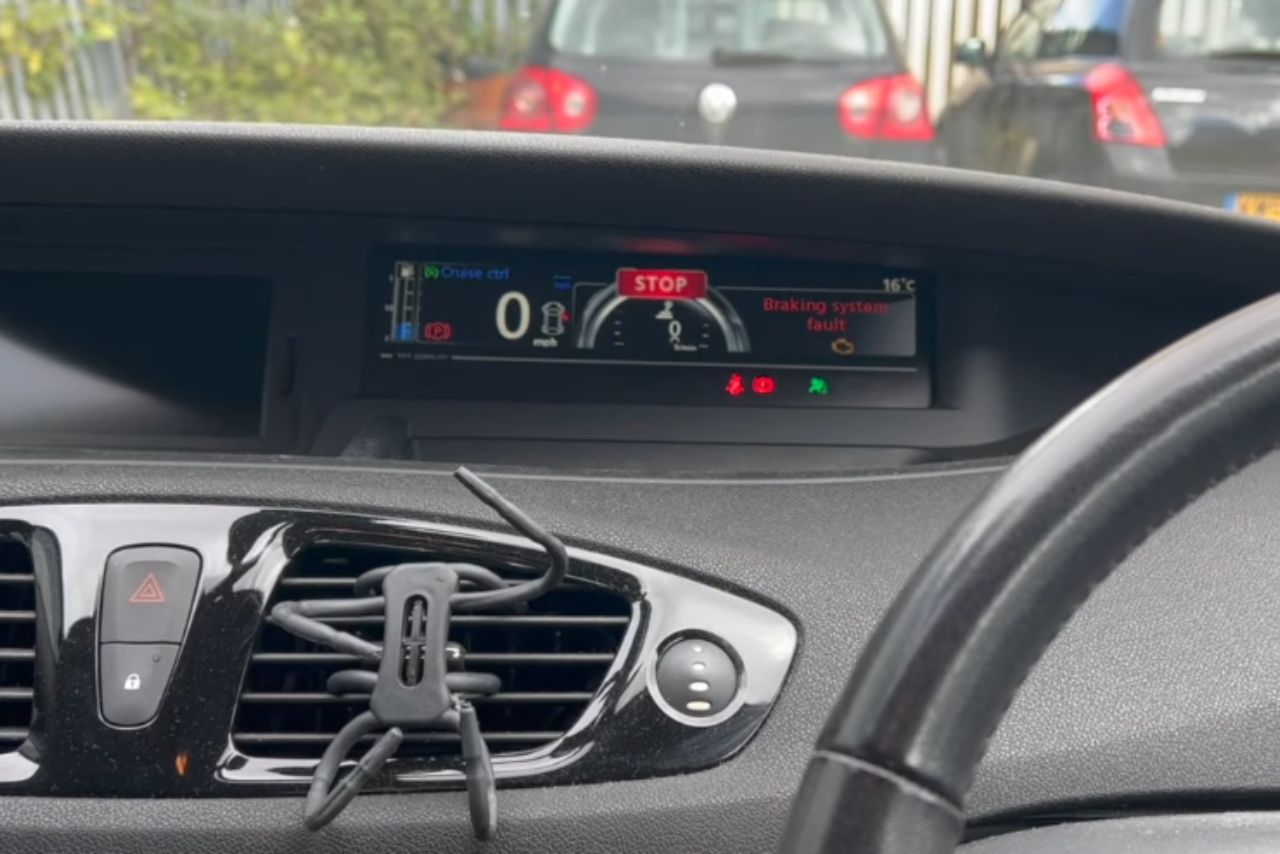When your Renault starts showing signs of a braking system fault, it can be quite disconcerting.
Renault Braking System Fault Could be due to low brake fluid level or worn-out brake pads and discs. Leaking in the brake hose or caliper can also lead to such faults. Similarly, faulty components like the brake sensor, ABS module, brake master cylinder or brake booster are other potential causes for a Renault Braking System Fault.
The best way to deal with these issues is by identifying them early on and addressing them promptly – whether that means topping up your brake fluid levels or replacing any faulty parts as necessary.
We’ll delve more into these causes and how you can tackle them effectively in this comprehensive guide.
Table of contents
Renault Braking System Fault Cause & Solutions:

1. Low Brake Fluid Level:

One common cause for a Renault Braking System Fault is a low brake fluid level. This critical component in the braking system requires monitoring and maintenance to ensure optimal performance.
Possible Indications:
Common Causes:
These issues can gradually decrease your car’s brake fluid level, leading to potential faults in your Renault’s braking system.
Diagnostic Steps:
Taking these steps will help identify whether you’re facing a problem due to low brake fluid level.
Solutions:
Always remember: Maintaining appropriate levels ensures safe functioning of brakes reducing chances for potential mishaps!
2. Worn Brake Pads or Discs:

Brake pads and discs are critical components of your Renault’s braking system. Over time, these parts can wear down, leading to a potential fault in the braking system. Here’s what you need to know:
Why Does This Happen?
Potential Risks:
| Problem | Solution |
|---|---|
| Excessive brake dust on wheels | Inspect and replace brake pads if necessary |
| Squealing noise when braking | Check disc for damage and replace if needed |
Note: It’s crucial to regularly service your vehicle and check the health of its components including brake pads/discs.
3. Leaking Brake Hose or Caliper:
A leaking brake hose or caliper is another common cause of a Renault braking system fault. It’s crucial to address this issue promptly as it directly affects the efficiency and safety of your brakes.
Brake Hose Leakage :
Caliper Leakage :
In both cases, immediate action should be taken by having a professional mechanic inspect and repair any leaks. Don’t ignore these signs because they can lead to more serious problems like total failure of your Renault’s braking system.
4. Faulty Brake Sensor:
A faulty brake sensor in your Renault can trigger a Braking System Fault. It’s one of the key components that ensures optimal brake performance.
Here are some signs indicating your brake sensor might be at fault:
Causes for a Faulty Brake Sensor:
There could be several reasons why the brake sensor goes faulty. Here are few common ones:
| Cause | Solution |
|---|---|
| Wear and Tear | Replace with new sensor |
| Dirt or Debris | Clean and check regularly |
| Damaged Wiring | Repair or replace wiring |
Having these issues checked by a professional mechanic is crucial for the safe operation of your vehicle’s braking system. Remember – safety first!
5. Faulty ABS Module:
The Anti-lock Braking System (ABS) module is a critical component of your Renault’s braking system. It ensures that the wheels don’t lock up during sudden braking, preventing skidding and offering better control.
When the ABS module becomes faulty, it can lead to a ‘Braking System Fault’ warning light on your dashboard.
Here are some symptoms and potential fixes:
Symptoms:
Potential Fixes:
| Symptom | Potential Fix |
|---|---|
| Unresponsive Brake Pedal | Module Replacement |
| Illuminated ABS Light | Electrical Repairs |
| Longer Stopping Distance | Module Replacement |
Remember: Always consult with a professional mechanic if you experience any of these symptoms for proper diagnosis and repair!
6. Faulty Brake Master Cylinder:
When it comes to the braking system of a Renault, one potential issue could be with the brake master cylinder. This component is crucial for delivering brake fluid under pressure from your foot to the rest of the braking system.
Here are some common signs that might indicate a faulty brake master cylinder:
To confirm if these symptoms are due to a faulty brake master cylinder, consider performing these checks:
| Sign/Symptom | Possible Indication |
|---|---|
| Spongy Brakes | Faulty Brake Master Cylinder |
| Fluid Leaks | Faulty Brake Master Cylinder |
| Warning Lights | Problems in Braking System |
Remember that maintaining regular service schedules helps prevent such failures and ensures safer drives!
7. Faulty Brake Booster:
A faulty brake booster can compromise your Renault’s braking system. It’s crucial to understand the signs and possible remedies.
Signs of a Faulty Brake Booster:
Reasons for Failure:
Brake boosters fail due to several reasons:
Troubleshooting Steps:
If you suspect a problem:
Remember, safety always comes first! For best results, have a professional mechanic inspect and repair any faults related to your braking system.
Fix this issue by following this video:
Conclusion and final thoughts 💭
Any Renault braking system fault is a serious concern that needs immediate attention. The causes vary from low brake fluid levels to worn-out brake pads or discs, and even leaking hoses or calipers.
Some faults may also be due to defective parts such as sensors, the ABS module, the master cylinder, or the booster.
Act promptly by seeking professional help when these symptoms surface. Regular maintenance checks are key in preventing these problems from escalating into major ones.
Remember, your vehicle’s safety depends on an effective braking system.











Leave a Reply